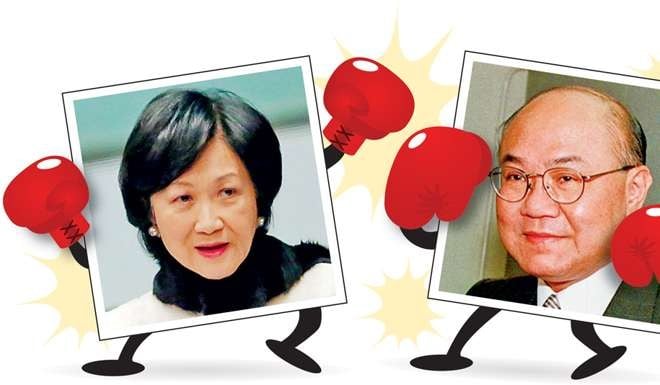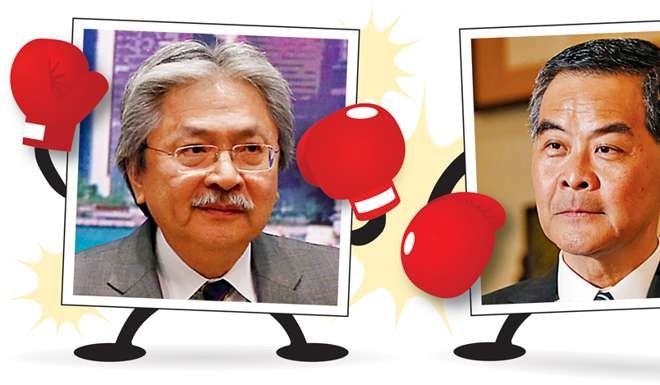
Retired judge pulls no punches as he launches bid for Hong Kong’s top job
As Woo Kwok-hing unexpectedly steps into the ring, the hands of would-be contenders may be forced into the fight to become chief executive
Bombshell might be too strong a word, but judging from the reactions of the big-name contenders who have spent months shadow boxing over their intentions to take the Hong Kong leadership crown, former judge Woo Kwok-hing’s unexpected step into the ring has certainly packed a political punch.
While his chances of taking the title would appear remote, the surprise move by the 70 year old – who cut his adversarial teeth in the courtroom and took on the role of referee by heading a host of government commissions of inquiry – looks to have administered a stiff dose of smelling salts to his more illustrious would-be competitors.
Announcing his bid for the top job on Thursday, Woo, who only last Tuesday stepped down as a Deputy High Court Judge, more or less hit his opponents with a straight right to the chin.
“I do not understand why the others were waiting. I was only waiting for my term as the deputy judge to end. What are they waiting for?” Woo said.
Ironically, his move – which no one predicted – bears an eerie similarity to that of the man he aims to unseat when polling day rolls around in March next year.
It was incumbent chief executive Leung Chun-ying who on September 20, 2011 dropped the bombshell that he was resigning as convenor of the Executive Council to run for chief executive.
It was a move that forced the hand of his key rival, then chief secretary Henry Tang Ying-yen, who announced his run a week later.

Like history repeating, the bold move by Woo has forced the hands of Leung and New People’s Party lawmaker Regina Ip Lau Suk-yee, who until yesterday had been, at best, oblique about their top-job election pretensions.
As if a bell had rung for the next round, Ip was first on her feet: “I am interested in running for the chief executive position and the preparation work is ongoing,” she told a morning radio show on Thursday.
The lawmaker and Executive Council member then set about landing punches on her potential competitors. First in the firing line was Leung.
“The problem for him is that society has a strong desire for change. For John Tsang Chun-wah [the city’s finance chief who is tipped to run], to be frank, I think he did not do much in the last decade,” said Ip, who went on to cast doubt on Woo’s knowledge of economic and livelihood issues.
Then it was sitting Chief Executive Leung Chun-ying’s turn to land some blows. It appeared that Tsang was his target, too, as he launched a thinly-veiled flurry of blows on officials who should be “responsible” rather than be mulling over whether they want to be the city’s next leader.
Tsang – a key lieutenant in the Leung administration – has been the subject of a series of reports that he will run.

After that opening salvo, Leung went in for the kill with what seemed to be a better-the-devil-you-know argument: “Will those pushing for the city’s independence stop what they are doing? Will those insulting their own country shut up?” he asked, referring to two Youngspiration lawmakers who triggered a political storm by using insulting language towards China during their swearing-in on October 12.
Warming to the theme, Leung went on: “Will the land and housing problems that have accumulated become easier to solve under a new leader or government? Will the cabinet continue to touch on vested interests in the property market with courage and determination, and amid difficulties, to solve the housing problems?”
Liberal Party honorary chairman James Tien Pei-chun, a strong advocate of the “Anyone but C.Y.” drive, was clearly in Tsang’s corner, claiming to have inside knowledge that the mustachioed money chief was a nailed-on certainty to run.
Ivan Choy Chi-keung, a political scientist at Chinese University, said Woo’s move had piled enormous pressure on those aspirants, who have been waiting for Beijing’s blessing.
“They might now push the central government for a clear answer as their public support might wane if it drags on,” he said.
Choy also said Tsang would be hit by Woo the most as both of them had adopted a relatively liberal approach compared to Leung.
Pan-democrats remained sceptical over Woo, with some casting doubt on whether he was here to snatch votes from Tsang to help hand victory to Leung.
Accountancy lawmaker Kenneth Leung, who has helped coordinate the election effort of several professional sectors, emphasised they would not waste time forming a stance on Woo at this stage.
While the pan-democrats have been lukewarm in sending their own representative to the top job race, Woo’s entry is set to further discourage them.
“When we now have a candidate who is against the Beijing-decreed political reform framework and anti-Leung – why do we still need to field a candidate to stir up questions on the issues we care about?” said Democratic Party vice-chairman Lo Kin-hei.
Additional reporting by Stuart Lau

